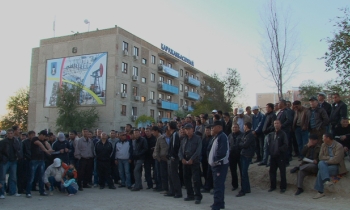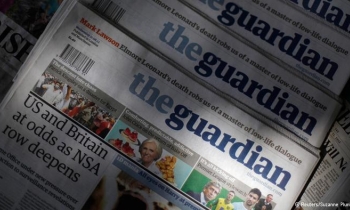Hundreds of protesters blockaded an Afghan hospital where freed Italian journalist Daniele Mastrogiacomo was staying on Tuesday, demanding details of the death of his beheaded driver, news agencies have reported.
More than 200 relatives and friends of executed driver Syed Agha protested outside the Italian-run Emergency hospital in the capital of southern Helmand province, Lashkar Gah, demanding to talk with the Italian, who was abducted by the Taliban two weeks ago. His translator, Ajmal Naqshbandi, is still being held.
La Repubblica correspondent Daniele Mastrogiacomo eventually left the Lashkar Gah hospital and was due in Kabul later and to fly straight through to Rome, officials said.
Mastrogiacomo, accused by the Taliban of spying for British troops, wrote in his paper on Tuesday of how he was forced to watch Agha die.
“I can still see it now,” he said. “I get off my knees. Four young men grab the driver and shove his face into the sand. They cut his throat and continue until they have cut his whole head. He is not able to make a gasp. They clean the knife on his tunic. They tie his severed head to his body. They bring it to the river and let it go.”
Agha was found guilty by a Taliban court of spying and killed on Thursday. Analysts say he was probably killed to pressure Kabul and Rome to meet Taliban demands.
Mastrogiacomo, Agha and Naqshbandi were abducted two weeks ago by the Taliban in Helmand province, the opium capital of the world’s biggest producer, about the same time NATO launched its biggest Afghan offensive.

The main Afghan journalists’ rights association appealed for the translator’s release. “Our message is clear. We are very much concerned about his life and his future,” spokesman Halim Fedaye told reporters.
In his Tuesday article, Mastrogiacomo did not explain why he was in a place most foreign journalists regard as too dangerous to visit, what he was doing to free his translator or what compensation would be offered to Agha’s family.
The Taliban say they freed him after the Afghan government handed over five insurgent leaders, including the brother of military commander Mullah Dadullah.
A spokesman for President Hamid Karzai said a deal had been struck, but would not give any details. “The president ... had instructed security authorities to find out any possible way for the release of the Italian journalist in recognition for the friendship with Italy and its cooperation with Afghanistan,” he told reporters. “A series of demands were made and they were met to some extent.”
Ezio Mauro, editor of La Repubblica, said he knew of no ransom paid in exchange for Mastrogiacomo’s release, according to an Associated Press (AP) report. But questions began to surface about how the journalist’s freedom had been secured.
Gino Strada, head of aid group Emergency which describes itself as neutral and provides medical assistance to victims of war, said Afghan President Hamid Karzai authorised the Taliban prisoners’ release to protests by his own government.

“The Afghan government was not a big help,” Strada told La Stampa, acording to a Reuters report. “(Italy’s ambassador) spent hours and hours fighting with ministers and Afghan officials that refused to carry out Karzai’s orders.”
In Italy, there was concern the government had paid too high a price.
“The government sold out,” ran the front-page headline in the right-wing Libero newspaper. “Reporter released in exchange for 5 Taliban,” said leading daily Corriere della Sera.
Libero wrote in a front-page edit: “To have opened the jail doors to five friends of throat-cutters in exchange for an unwise journalist is straight-out repugnant.”
La Stampa daily questioned whether the negotiations to free the La Repubblica journalist were hypocritical, given Rome had 1,900 peacekeepers in Afghanistan meant to help NATO secure the country after the US-led overthrow of the Taliban in 2001.
“If this is the just price chosen to pay to save the life of Mastrogiacomo, it’s up to (the government) to show Italy is still able to continue fulfilling its role in Afghanistan without becoming the weak link in the international alliance.”
Khan Jan, uncle of the slain driver, said there was no indication the government did anything to try to get the Afghans released. “Yesterday he (Karzai) was talking about the Italian guy, but he didn’t say anything about the Afghan driver,” Jan said. “Nobody there was trying to free him. ... Now we know he’s dead, we are very upset, and we didn’t even get the dead body.”









